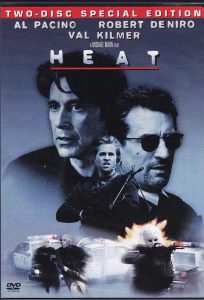An action-adventure genre about moral codes and a morality tale. Two ‘addicted’ main characters with f—ked up lives. A duality and yet rapport of alter egos; both professional with integrity. A movie about character and choices.
This is very much an actors’ film. Al Pacino plays Vincent–a hyper, hard-nosed L.A. detective who specializes in busting ‘scores’ and outwitting evil criminals. Robert de Niro plays the more subdued, but rigid Neil, who tries to stick to his ‘program’ without losing his edge to spontaneity and a non-criminal fantasy life.The big scene, actually the first climax, occurs midway in the film when they meet in a coffee shop for a unexpectedly quiet, reflective 7-minute conversation that epitomizes the artfulness of this masterpiece.
The rest of the casting is fantastic and the quality of acting is genuine and authentic in feel. Val Kilmer plays Chris, Tom Sizemore plays Michael: two of the gang who reveal depths of character for their supporting roles. Kevin Gage is awesomely scary as ‘loose-screw’ Waingro, the violent rogue gang member who is revealed to be a pyscho-serial-killer. Jon Voight also gives a memorable, understated performance as Nate, the seamy fence middle-man.
The women actors (Diane Venora, Amy Brenneman, and Ashley Judd) are, likewise, strong, effectively portraying the women in conflict with Vincent, Neil, and Chris. They give sympathetic, nuanced, and believable performances.
The intense action scenes are realistic and quite outstanding. The actors had to rehearse their shooting scenes on a firing range using real bullets. The bank robbery-gone-wrong climax featured 800-1000 shots used in each take.
The musical score by Elliot Goldenthal is memorably unique and uses many avant-garde pieces from a variety of sources and other composers. These are essentially tactile sound-experiments created by cellos, multiple electric guitars, and percussion instruments.
The look of the film is predominantly an edgy blue and grey palette. In particular, cinematographer Danti Spinotti makes L.A. by night look very different from myriad other films. There is even one scene with de Niro looking at the ocean which resembles Alex Colville’s classic painting “Pacific”, but shot entirely in blue.
The ending is poetic and one that makes the connection between the two alter-ego lead characters. It is the best possible ending for a film with this much subject-matter depth and an adroit, masterful style. It’s hard to imagine any viewer not being moved or disappointed by Mann’s choices in the showdown-finale.
Highly recommended: the 2-disc DVD set with numerous interesting extras. (Language and violence warning. IMHO: not for under 18s.)

